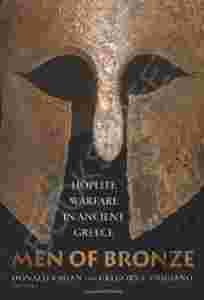|
Men of Bronze takes up one of the most
important and fiercely debated subjects in ancient
history and classics: how did archaic Greek hoplites
fight, and what role, if any, did hoplite warfare play
in shaping the Greek polis? In the nineteenth century,
George Grote argued that the phalanx battle formation of
the hoplite farmer citizen-soldier was the driving force
behind a revolution in Greek social, political, and
cultural institutions. Throughout the twentieth century
scholars developed and refined this grand hoplite
narrative with the help of archaeology. But over the
past thirty years scholars have criticized nearly every
major tenet of this orthodoxy. Indeed, the revisionists
have persuaded many specialists that the evidence
demands a new interpretation of the hoplite narrative
and a rewriting of early Greek history. Men of
Bronze gathers leading scholars to advance the
current debate and bring it to a broader audience of
ancient historians, classicists, archaeologists, and
general readers.
After explaining the historical
context and significance of the hoplite question, the
book assesses and pushes forward the debate over the
traditional hoplite narrative and demonstrates why it is
at a crucial turning point. Instead of reaching a
consensus, the contributors have sharpened their
differences, providing new evidence, explanations, and
theories about the origin, nature, strategy, and tactics
of the hoplite phalanx and its effect on Greek culture
and the rise of the polis.
The contributors include
Paul Cartledge, Lin Foxhall, John Hale, Victor Davis
Hanson, Donald Kagan, Peter Krentz, Kurt Raaflaub, Adam
Schwartz, Anthony Snodgrass, Hans van Wees, and Gregory
Viggiano.
|
|

